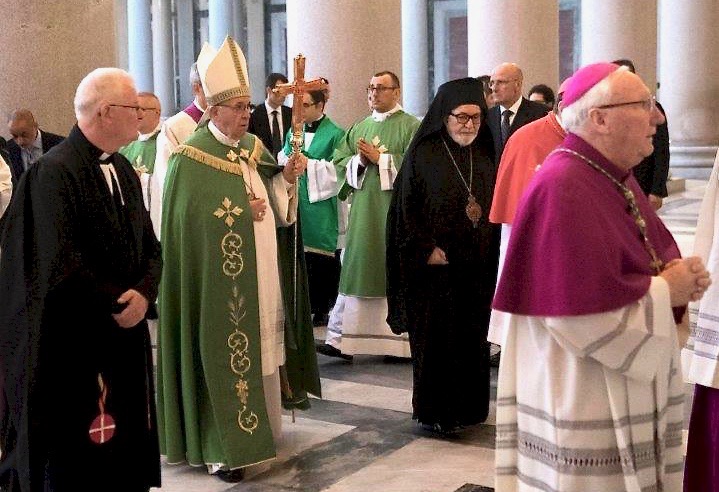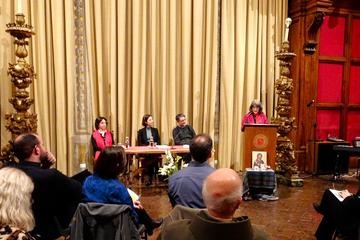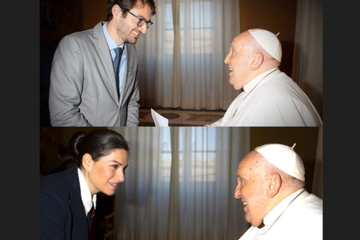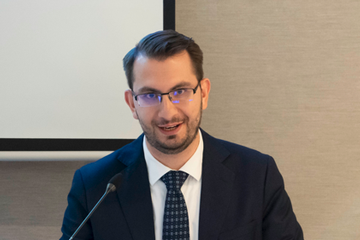
By Elena Dini
ROME — Bishop Brian Farrell, LC, secretary of the Pontifical Council for Promoting Christian Unity, will speak on “The Ecumenism of Pope Francis” at the Centro Pro Unione Jan. 23. Bishop Farrell is the main presenter at an ecumenical afternoon of prayer and reflection, organized by The Lay Centre and the Centro Pro Unione, to mark the Week of Prayer for Christian Unity, observed worldwide from Jan. 18 to 25. Bishop Farrell shared with us some of his reflections on Christian unity in advance of his presentation.
Q. The Week of Prayer for Christian Unity has a long history. What have been its fruits over the past decades and in what ways do you think it will continue being an important moment for the life of the Church?
Bishop Farrell: Indeed, the Week of Prayer has a long history that shows how holy men and women in many churches have understood that division is a turning away from God’s will and that the unity of Christians is a grace to be asked for and prepared for by turning to God in prayer. The roots of the Week of Prayer lie in the 19th century, where we find different Christian communities beginning to devote a special time to praying for the unity of Christians: the Evangelical Alliance in 1846, the Anglican Communion in the 1878 Lambeth Conference, and in that same year Leo XIII called on Catholics to pray for “the Re-union of Christendom.”
In the 20th century, there was first the Octave of Christian Unity, established by the Episcopalian priest Paul Wattson in 1908, its adoption by the first World Conference on Faith and Order, the broadening of the Octave to the Week of Prayer under the influence of Father Paul Couturier, so that gradually Christians no longer prayed separately for Christian unity, but prayed for unity together at the same time. A key step came after a consultation between the World Council of Churches and the Catholic Church in 1966, in the wake of the Second Vatican Council. Since then, the preparation of the materials for the week has been a collaborative work between Faith and Order and the Pontifical Council. Christians everywhere are becoming gradually more aware of the painful effects of division, and their faith tells them that only God’s grace can heal the wounds inherited from history.
Having a Week of Prayer for Christian Unity draws attention to the scandal of division and encourages communities to meet, to know each other and so overcome false images that we can have of other Christians. It very often brings pastors into a relationship of mutual support and collaboration in facing the challenges of their ministry. In many places, the Week of Prayer has become a time of very effective catechesis about the Church and its role in people’s spiritual life and their service to their communities. From reports that we receive from around the world and in our meetings with the bishops’ conferences, we know that at the local level Catholics generally are quite active in organizing prayer events during the week. Where necessary, we try to encourage dioceses and Catholic associations to become involved. At the level of Church leaders, there are also significant celebrations. Christian communities, working together, motivated by a common Christian faith are a powerful witness to the world of our faith in Jesus Christ.
Spiritual ecumenism is the “soul of the ecumenism,” which means that prayer, conversion and holiness are indispensable as conditions for reconciliation between Christians and among the churches. Even when we reach the unity Christ calls us to, the reality of sin and division is never far away in this life, and so prayer for unity will continue to be necessary.
Q. What are the peculiar aspects of the ecumenism of Pope Francis?
Bishop Farrell: Many say that Pope Francis has accelerated the pace of ecumenical relations. I think it is fair to say that his ecumenical words and actions have had an enormous effect. Other Christians know that he has their interests at heart, that he loves to meet them, pray with them and share the burdens of ministry with them. He always talks about “walking together:” that ecumenism is a process in which Christians journey together. In praying together and working together on this journey, we come to know other Christians better and value them more highly. We come to appreciate their deep commitment to the faith and their real love of the Lord. In recent years, the materials for the Week of Prayer have urged Christians to work together particularly for the needs of those who are most vulnerable and needy.
Pope Francis insists that this joint journey calls for humility on everyone’s part. All remember him on the night of his election, bowing before the crowd in St. Peter’s Square and asking for their prayers. He has done the very same thing before other Christian leaders, before the Ecumenical Patriarch, the Archbishop of Canterbury and Evangelical and Pentecostal leaders. He shows that he believes that other Christians have gifts of grace to give us, that we can be blessed by them. In “Evangelii Gaudium,” he wrote how we need to receive what the Spirit has sown in other Christian communities, which is meant to be a gift also for us.
Q. Pope Francis will soon be in Bari again, where he was in July 2018 together with the patriarchs of the Middle East. There are some areas of the world, such as the Middle East, where ecumenism is clearly part of the life of local communities. What can we learn from such experiences?
Bishop Farrell: The Middle East is the region where millions of Christians in many different churches have lived side by side for centuries, mostly in a minority situation. The churches have learned to respect each other and help each other in their many challenges. Especially in times of persecution, they stand together and recognize that they need one another, and that their suffering is precisely because they are all followers of Christ — what Pope Francis refers to as the “ecumenism of blood.” No matter what their different traditions, they are united in the cross of Jesus. This should teach us to look first at the many things that unite Christians, before we look at the things that keep us separated.
This time in Bari, Pope Francis will be meeting the Catholic bishops from all around the Mediterranean. I am certain that the ecumenical situation will be an important part of his message. The time is past when a single church can think only of itself. The mission to preach the Gospel to the whole of creation is shared by all Christians.
Q. What are the concrete steps local communities could take to favor Christian unity?
Bishop Farrell: They should take active steps to know each other better, for example by praying together and attending services together on particular occasions. This is what is called “the dialogue of love.” They should cooperate and work together as much as possible in serving their communities, in what is called “pastoral ecumenism.” When they do this, their common Christian witness is strengthened in practical ecumenism. Local situations are different, so that there is ample room for creativity and initiative in ecumenical activity.
Caption: Pope Francis at the Vespers service that concluded the 2019 Week of Prayer for Christian Unity at the Basilica of St. Paul Outside the Walls. (Photo courtesy of the Pontifical Council for Promoting Christian Unity)


